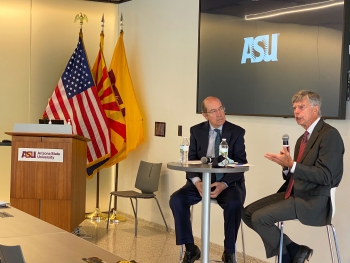One of the many fascinating things about the English language is that it never stops evolving. New words—as well as new meanings of old words—are always being added to our lexicons. Some are just fads or flash-in-the-pan slang, but plenty garner enough steam and are used widely enough to become part of the official English language. In fact, 455 new words were added to the Merriam-Webster dictionary in Oct. 2021. With that in mind, read on to discover 20 new words you won't believe just got added to the dictionary—from social media slang to terms that are products of the pandemic.
RELATED: 40 Words That Will Instantly Reveal Your True Age.

They've become an increasingly common sight in the kitchens of people who are looking for a healthier alternative to pan-frying or deep-frying certain food items, and now this modern cooking machine is officially part of the English language. According to Merriam-Webster an air fryer is "an airtight, usually small electrical appliance for quick cooking of foods by means of convection currents circulated rapidly by a fan."
Hey, try these wings I made for the game. They are healthier than you'd expect because I cooked them in my new air fryer.
RELATED: The 40 Funniest Words in the English Language—And How to Use Them.

This popular slang version of the phrase "am I right" is now officially part of the English language. According to Merriam-Webster the term is "used in writing for "am I right" to represent or imitate the use of this phrase as a tag question in informal speech."
There sure are some crazy new words in the dictionary, amirite?

Meaning "by reason of," this preposition use of because is "often used in a humorous way to convey vagueness about the exact reasons for something," according to Merriam-Webster.
The weather has changed drastically in the last week because science.

You may text this three letter acronym to a friend right before you provide your opinion on something. It stands for "to be honest" and, as of Oct. 2021, this common text term is in the dictionary.
TBH, I thought Suzie's band was just so-so.

Want to show your support of something you or someone else said on social media or in text in a cheeky, modern way? Simply type FTW.
FTW stands for "for the win—used especially to express approval or support," Merriam-Webster says.
My flight was only half full so they upgraded me to first class FTW!

If you see a person sporting a hairdo "resembling a Mohawk in having a central ridge of upright hair but with the sides gathered or slicked upward or back instead of shaved," then that person is rocking a faux-hawk, according to the Merriam-Webster official definition.
Did you see John's new hairstyle? He gels it up so it's spiked down the center. It's a total faux-hawk!

If you see a grown man that lacks muscle definition and is maybe a few pounds on the heavier side, he's got what popular culture has deemed a dad bod, or "a physique regarded as typical of an average father," especially "one that is slightly overweight and not extremely muscular," according to Merriam-Webster.
Tommy must have canceled his gym membership because he didn't used to have such a dad bod.

Home security devices like Ring have become increasingly popular in the last couple of years. So much so that there is now a term for them in the dictionary. A doorbell camera is, according to Merriam-Webster, "a small camera that is designed for use on an exterior door, that includes or connects to a doorbell, and that often has a built-in microphone and speaker."
My package was stolen from my front door, but thanks to my doorbell camera they were able to catch the guy who did it.

If you've ever eaten a sandwich of peanut butter and marshmallow spread then you've had what is now officially known as a fluffernutter.
All the kids love going over to Jimmy's because his mom always makes them fluffernutters for a snack.

You've been able to order them at coffee shops and restaurants for a while now, but this beverage name only recently made its way into the dictionary.
A horchata is "a cold sweetened beverage made from ground rice or almonds and usually flavorings such as cinnamon or vanilla."
Nothing tastes better on a warm fall day than a delicious horchata.

People that post controversial or hateful content on social media run the risk of being deplatformed, which means "to remove and ban (a registered user) from a mass communication medium (such as a social networking or blogging website)."
I bet they deplatform Joe any day now, given all the dangerous misinformation he's been spreading online.

With so many people working from home because of the pandemic, there's been a real rise in the number of digital nomads, or "someone who performs their occupation entirely over the Internet while traveling."
Have you seen Lindsay lately? It's been so hard to make plans with her because she's such a digital nomad these days.

While breakthrough was already in the dictionary, the medical use of the term is a new addition thanks to COVID-19. It refers to an "infection occurring in someone who is fully vaccinated against an infectious agent."
The rise of the Delta variant resulted in an increasing number of breakthrough infections.

The pandemic has resulted in a number of new terms that we've added to our collective lexicon. And one that is now officially part of the English language is super-spreader, which refers to "an event or location at which a significant number of people contract the same communicable disease."
I'm going to pass on the concert tonight—it seems like a real super-spreader situation if you ask me.

Those patients who experienced symptoms long after their initial diagnosis of COVID-19 had what is called long COVID, which Merriam-Webster defines as "a condition that is marked by the presence of symptoms (such as fatigue, cough, shortness of breath, headache, or brain fog) which persist for an extended period of time (such as weeks or months) following a person's initial recovery from COVID-19 infection."
This long COVID is brutal. It's been weeks since I got the virus and I'm still feeling exhausted.

In some states like New York, in order to attend crowded indoor events or dine in restaurants you have to provide your vaccine passport, or "a physical or digital document providing proof of vaccination against one or more infectious diseases."
I'll pick you up at 12:30 p.m. for the football game, don't forget to have your vaccine passport.
RELATED: Never Say These 2 Words to a Flight Attendant, Expert Warns.

While pregnancy only has three trimesters, there is now an official term for the months following childbirth called the fourth trimester, which refers to "the three month period immediately following giving birth in which the mother typically recovers from childbirth and adjusts to caring for her infant."
Being a new mom can be really overwhelming, the fourth trimester has been a huge adjustment period for me.

If you've ever eaten a pork rind, then you've had a chicharron, or "a small piece of pork belly or pig skin that is fried and eaten usually as a snack."
It's too bad you're a vegetarian, this place makes the best chicharrones in the city.
For more language facts sent straight to your inbox, sign up for our daily newsletter.

If you order food delivery frequently, chances are you've eaten food prepared at a ghost kitchen, or "a commercial cooking facility used for the preparation of food consumed off the premises."
This place is one of my favorites but you can only get delivery because their food is made in a ghost kitchen.

If you've ever seen a tweet, meme, or video that has been shared by multiple people over multiple platforms then you have seen what is now officially known as copypasta, or "data (such as a block of text) that has been copied and spread widely online."
I've seen that tweet everywhere lately. I don't get why, but for whatever reason it has become total copypasta.
RELATED: The 60 Most Beautiful Words in the English Language—And How to Use Them.
/cloudfront-us-east-1.images.arcpublishing.com/gray/N4LUYFKXANASTBHYZQBCCKI4UY.jpg)







